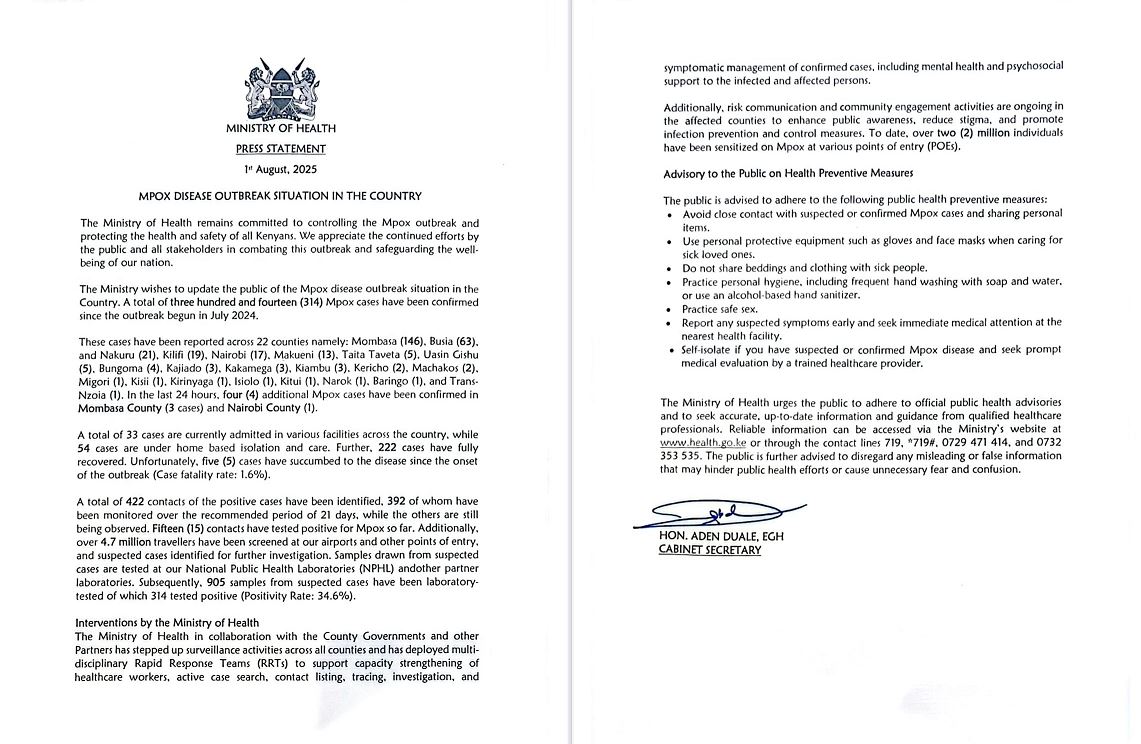Ministry of Health statement on Mpox Outbreak in Kenya
Ministry of Health statement on Mpox Outbreak in Kenya and measures taken to control spread.

The Ministry of Health remains committed to controlling the Mpox outbreak and protecting the health and safety of all Kenyans. We appreciate the continued efforts by the public and all stakeholders in combating this outbreak and safeguarding the well-being of our nation.
The Ministry wishes to update the public of the Mpox disease outbreak situation in the Country. A total of three hundred and fourteen (314) Mpox cases have been confirmed since the outbreak begun in July 2024.
These cases have been reported across 22 counties namely; Mombasa (146), Busia (63), and Nakuru (21), Kilifi (19), Nairobi (17), Makueni (13), Taita Taveta (5), Uasin Gishu (5), Bungoma (4), Kajiado (3), Kakamega (3), Kiambu (3), Kericho (2), Machakos (2), Migori (1), Kisii (1), Kirinyaga (1), Isiolo (1), Kitui (1), Narok (1), Baringo (1), and Trans-Nzoia (1). In the last 24 hours, four (4) additional Mpox cases have been confirmed in Mombasa County (3 cases) and Nairobi County (1).
A total of 33 cases are currently admitted in various facilities across the country, while 54 cases are under home based isolation and care. Further, 222 cases have fully recovered. Unfortunately, five (5) cases have succumbed to the disease since the onset of the outbreak (Case fatality rate: 1.6%).
A total of 422 contacts of the positive cases have been identified, 392 of whom have been monitored over the recommended period of 21 days, while the others are still being observed. Fifteen (15) contacts have tested positive for Mpox so far. Additionally, over 4.7 million travellers have been screened at our airports and other points of entry, and suspected cases identified for further investigation. Samples drawn from suspected cases are tested at our National Public Health Laboratories (NPHL) and other partner laboratories. Subsequently, 905 samples from suspected cases have been laboratory-tested of which 314 tested positive (Positivity Rate: 34.6%).
Interventions by the Ministry of Health
The Ministry of Health in collaboration with the County Governments and other Partners has stepped up surveillance activities across all counties and has deployed multi-disciplinary Rapid Response Teams (RRTs) to support capacity strengthening of healthcare workers, active case search, contact listing, tracing, investigation, and symptomatic management of confirmed cases, including mental health and psychosocial support to the infected and affected persons.
Additionally, risk communication and community engagement activities are ongoing in the affected counties to enhance public awareness, reduce stigma, and promote infection prevention and control measures. To date, over two (2) million individuals have been sensitized on Mpox at various points of entry (POEs).
Advisory to the Public on Health Preventive Measures
The public is advised to adhere to the following public health preventive measures:
- Avoid close contact with suspected or confirmed Mpox cases and sharing personal items.
- Use personal protective equipment such as gloves and face masks when caring for sick loved ones.
- Do not share beddings and clothing with sick people.
- Practice personal hygiene, including frequent hand washing with soap and water, or use an alcohol-based hand sanitizer.
- Practice safe sex.
- Report any suspected symptoms early and seek immediate medical attention at the nearest health facility.
- Self-isolate if you have suspected or confirmed Mpox disease and seek prompt medical evaluation by a trained healthcare provider.
The Ministry of Health urges the public to adhere to official public health advisories and to seek accurate, up-to-date information and guidance from qualified healthcare professionals. Reliable information can be accessed via the Ministry’s website at www.health.go.ke or through the contact lines 719, *719#, 0729 471 414, and 0732 353 535. The public is further advised to disregard any misleading or false information that may hinder public health efforts or cause unnecessary fear and confusion.
HON. ADEN DUALE, EGH CABINET SECRETARY